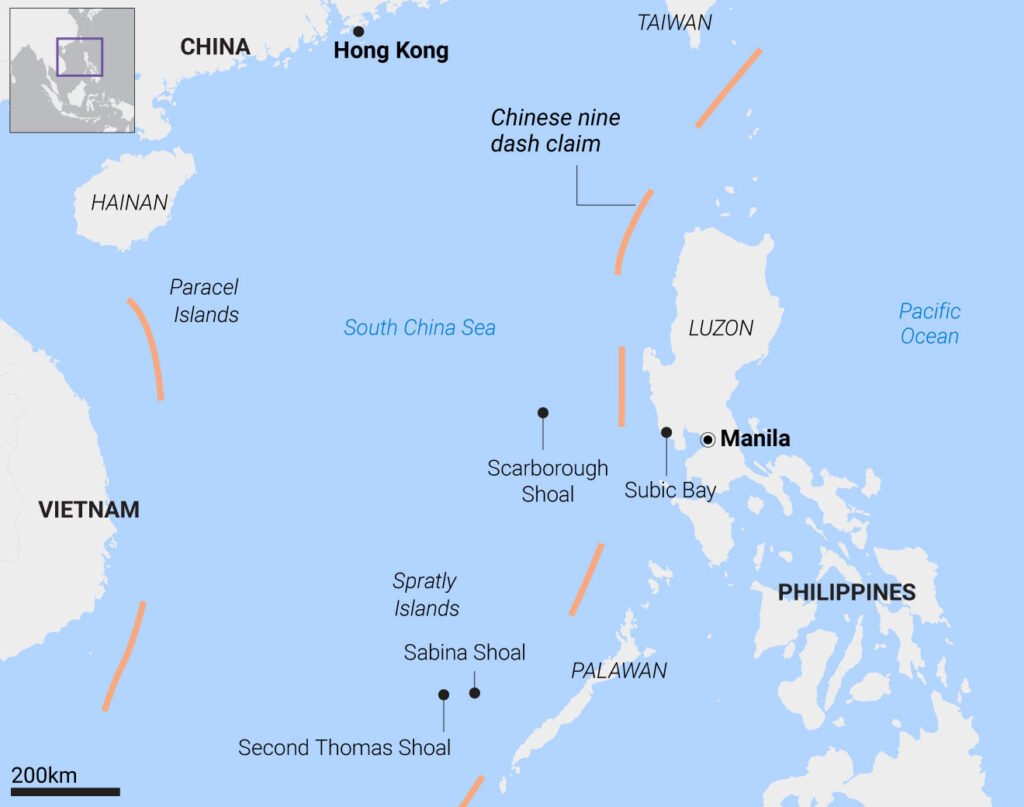March 2, South China: China has accused the Philippines of polluting the environment in the disputed South China Sea, releasing footage it claims shows Philippine troops burning rubbish at Second Thomas Shoal, a reef both nations claim as their own. The video, shared by state broadcaster on Saturday, depicts smoke billowing from the BRP Sierra Madre, an aging warship deliberately grounded by the Philippines on the reef in 1999. A report alleged that marines stationed on the ship were burning refuse, posing “a serious threat to the ecological environment of the surrounding waters.”
The reef, known as Renai Reef in China and Ayungin Shoal in the Philippines, lies approximately 200 kilometers (120 miles) from the Philippine island of Palawan and has been a focal point of tension between the two nations. China’s Ministry of Natural Resources previously claimed that the prolonged presence of the Sierra Madre has “severely damaged the diversity, stability, and sustainability of the coral reef ecosystem.” The Philippines has yet to respond to these allegations.
The BRP Sierra Madre, a World War II-era tank-landing ship, has been a symbol of Manila’s territorial claims in the South China Sea. China has repeatedly demanded its removal, describing the vessel as an “ecological graveyard” due to its corroded structure, which it claims risks disintegration and further environmental harm. Beijing has also expressed concerns that delivering construction materials to the ship could strengthen the Philippines’ presence on the reef.
Tensions over the Sierra Madre have escalated in recent years. In 2023, China intercepted Philippine resupply missions, accusing Manila of transporting construction materials. Last year, Beijing alleged that Philippine troops on the ship pointed weapons at Chinese coastguards. Despite these disputes, the two countries reached a provisional agreement in July 2023 to allow the delivery of necessities to troops stationed on the ship. However, disagreements over the terms of the deal quickly emerged. China insisted that the Philippines had agreed to three conditions: the eventual removal of the ship, prior notification of resupply missions, and on-site verification by China to ensure no construction materials were included. The Philippines, however, denied compromising its sovereignty or granting China oversight.
A 2023 report by China’s Ministry of Natural Resources accused the Sierra Madre of leaking rust and pollutants, causing “irreversible harm” to the coral reef ecosystem. The report claimed that coral coverage within 400 meters (1,300 feet) of the ship had declined by nearly 90%, heavy metal concentrations in the water had exceeded safe levels, and marine life had been adversely affected. It also alleged that Philippine personnel dumped wastewater and rubbish into the lagoon, condemning these actions as “reckless environmental destruction.”

The Philippines has dismissed China’s accusations as “false and a classic misdirection,” countering that Chinese fishing boats have caused significant damage to corals and marine habitats, jeopardizing the livelihoods of Filipino fisherfolk. Neutral environmental experts have been unable to access the area to verify the claims, leaving the dispute unresolved. As tensions persist, the environmental impact of the standoff remains a contentious issue in the broader South China Sea conflict.
Get more News Headlines on our Social Platforms And Do Follow.
https://rb.gy/q8ugti
https://rb.gy/t4q0ay
rebrand.ly/pwoq4qx
rebrand.ly/nddyfab




